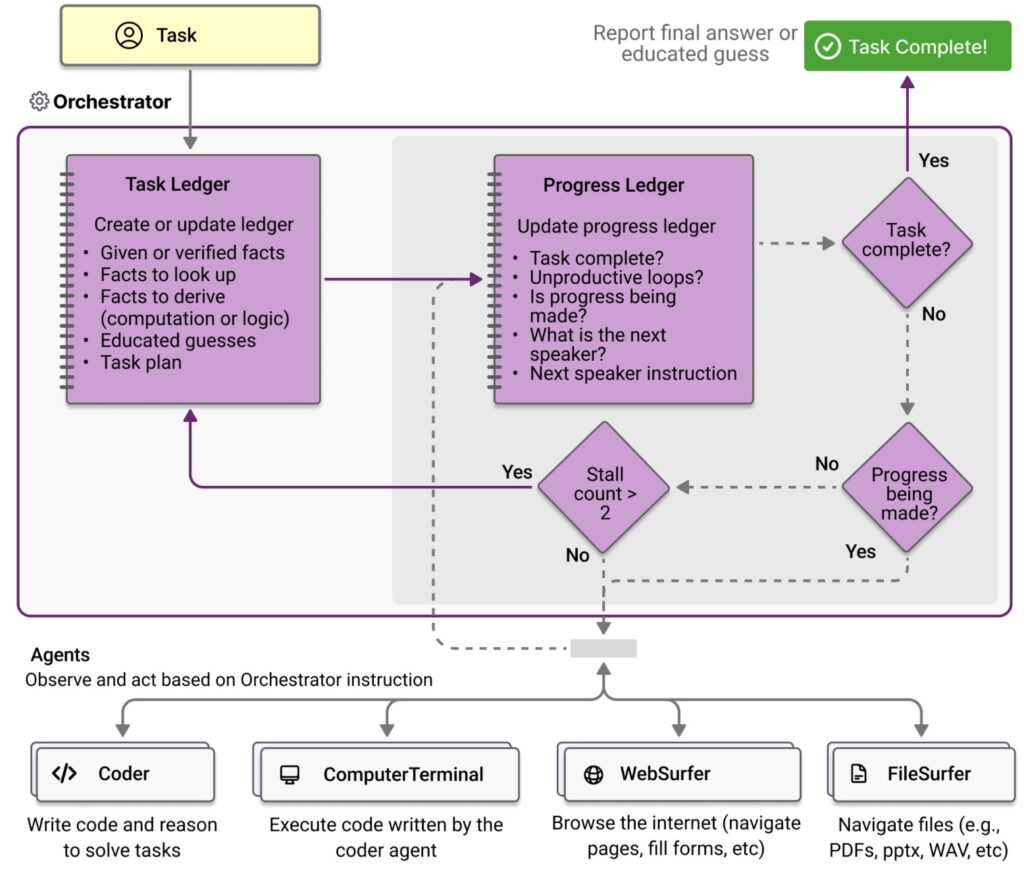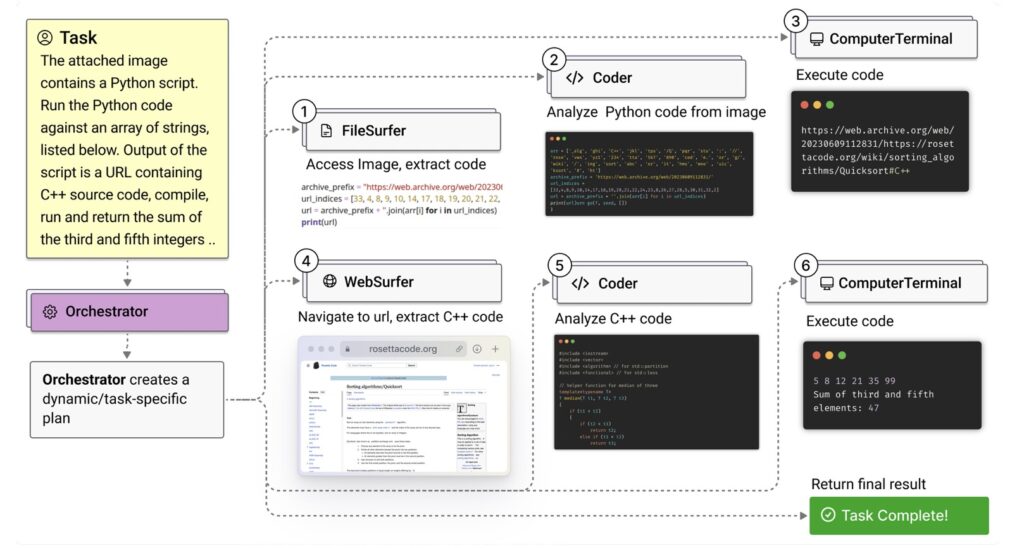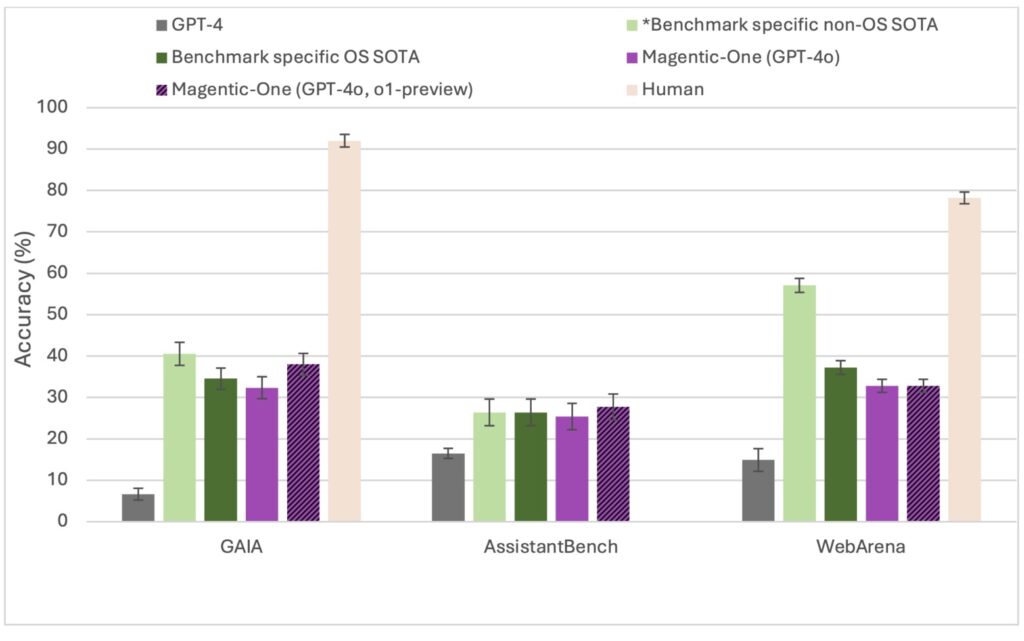With its new modular architecture, Magentic-One tackles complex tasks across domains, promising a future of AI-driven workflows.
- Multi-Agent Capabilities: Magentic-One uses a modular, multi-agent design, enabling it to perform complex tasks like coding, file management, and web navigation autonomously.
- Open-Source for Flexibility: Available on Microsoft’s AutoGen platform, this open-source tool offers developers a customizable and scalable solution for creating adaptable AI agents.
- Built-In Safety Mechanisms: Microsoft has integrated safety protocols to address potential risks, aligning with Responsible AI principles for secure deployment.
In a significant step toward autonomous AI, Microsoft has launched Magentic-One, an open-source, multi-agent AI platform designed to handle complex, multi-step tasks independently. Built on the Microsoft AutoGen framework, Magentic-One allows developers to create sophisticated AI agents that operate in tandem, each with specialized roles to manage tasks like coding, file management, and web interactions. As the demand for agentic AI grows, Microsoft positions Magentic-One as a flexible, scalable solution for researchers and developers exploring the future of autonomous AI applications.

A Modular Multi-Agent Architecture for Complex Tasks
At the core of Magentic-One is a modular multi-agent system where an Orchestrator agent coordinates four other specialized agents: WebSurfer, FileSurfer, Coder, and ComputerTerminal. This structure allows Magentic-One to break down tasks into manageable subtasks, which the specialized agents execute individually, making it versatile for applications across domains like software engineering, data analysis, and scientific research. Unlike traditional single-agent systems, Magentic-One’s plug-and-play design enables the seamless addition or removal of agents without disrupting the core structure, enhancing its adaptability for complex workflows.

Open-Source Accessibility with AutoGen Flexibility
Magentic-One is accessible as an open-source tool through Microsoft’s AutoGen platform, inviting developers to experiment with its modular structure. AutoGen supports integration with a variety of large language models (LLMs) and smaller, task-specific models, making Magentic-One model-agnostic and allowing users to tailor performance and cost. Tested with models like GPT-4o and OpenAI’s o1-preview, Magentic-One’s open-source nature not only democratizes access to multi-agent systems but also empowers the community to iterate on and expand its capabilities.
Evaluating Performance with AutoGenBench
To benchmark Magentic-One’s capabilities, Microsoft introduced AutoGenBench, a tool designed to evaluate agentic performance on complex tasks that require multi-step planning and tool use. Magentic-One has shown competitive results against state-of-the-art benchmarks such as GAIA, AssistantBench, and WebArena, excelling at tasks that require inter-agent coordination and adaptability. This benchmarking framework ensures that Magentic-One can meet industry standards while offering researchers a tool to explore the system’s robustness in real-world applications.

Built-In Safety Measures for Responsible AI Deployment
With Magentic-One’s advanced capabilities come inherent risks. Microsoft has integrated multiple safety protocols to ensure responsible use, including sandboxed environments, monitoring tools, and human-in-the-loop guidance for high-stakes actions. During development, Microsoft’s Deployment Safety Board rigorously tested the system for vulnerabilities, incorporating safety mechanisms like action reversibility checks and filtering to avoid unintended consequences. These safeguards are part of Microsoft’s commitment to Responsible AI, providing transparency and control to mitigate risks as agentic systems become more capable.
Magentic-One represents a groundbreaking development in multi-agent AI, offering a flexible, open-source platform that can tackle open-ended tasks autonomously. By facilitating modularity and safety in agentic systems, Microsoft has set a new standard for AI-driven workflows. As Magentic-One evolves, its potential to transform industries by enhancing productivity and efficiency becomes increasingly clear. Microsoft’s vision for Magentic-One, combined with the open-source community’s contributions, could make agentic AI a cornerstone of future autonomous systems, paving the way for safe, reliable, and impactful applications across diverse fields.

